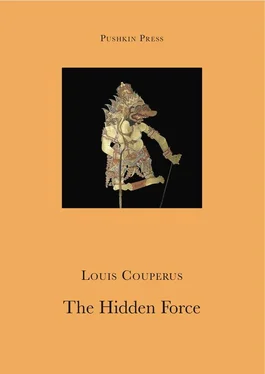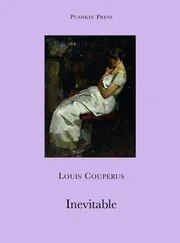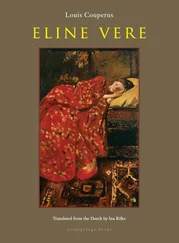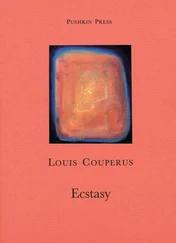Louis Couperus - The Hidden Force
Здесь есть возможность читать онлайн «Louis Couperus - The Hidden Force» весь текст электронной книги совершенно бесплатно (целиком полную версию без сокращений). В некоторых случаях можно слушать аудио, скачать через торрент в формате fb2 и присутствует краткое содержание. Год выпуска: 2012, ISBN: 2012, Издательство: Pushkin Press, Жанр: Классическая проза, на английском языке. Описание произведения, (предисловие) а так же отзывы посетителей доступны на портале библиотеки ЛибКат.
- Название:The Hidden Force
- Автор:
- Издательство:Pushkin Press
- Жанр:
- Год:2012
- ISBN:9781908968227
- Рейтинг книги:4 / 5. Голосов: 1
-
Избранное:Добавить в избранное
- Отзывы:
-
Ваша оценка:
- 80
- 1
- 2
- 3
- 4
- 5
The Hidden Force: краткое содержание, описание и аннотация
Предлагаем к чтению аннотацию, описание, краткое содержание или предисловие (зависит от того, что написал сам автор книги «The Hidden Force»). Если вы не нашли необходимую информацию о книге — напишите в комментариях, мы постараемся отыскать её.
The Hidden Force — читать онлайн бесплатно полную книгу (весь текст) целиком
Ниже представлен текст книги, разбитый по страницам. Система сохранения места последней прочитанной страницы, позволяет с удобством читать онлайн бесплатно книгу «The Hidden Force», без необходимости каждый раз заново искать на чём Вы остановились. Поставьте закладку, и сможете в любой момент перейти на страницу, на которой закончили чтение.
Интервал:
Закладка:
“I think I’ve sometimes felt it too,” she whispered. “When I walked with Van Helderen along the seashore, and the sky was so distant, the night so deep, or when the rains came rushing from so far away and then descended… or when the nights, deathly quiet and yet so brimful of sound, trembled around you, always with a music that could not be grasped and scarcely heard… Or simply when I looked into the eyes of a Javanese, when I talked to my maid and it was as if nothing I said got through to her, or as if her answer concealed her real, secret answer…”
“That’s something different,” he said. “I don’t understand that: I personally knew the Javanese. But perhaps every European feels that in a different way, depending on his predisposition, and his nature. For one person it is the antipathy that he felt from the beginning in this country, which attacks the weak spot in his materialism and goes on fighting him… while the country itself is so full of poetry and… mystery… I’d almost say. For another person it’s the climate, or the character of the natives, or what have you, that are hostile and incomprehensible. For me… it was facts I could not fathom… at least that was how it seemed to me. Then it seemed as if I didn’t understand anything any more… That was how I became a bad official, and then I realized that the game was up. So I quite calmly packed it in, and now I’m here, and here’s where I’ll stay. And do you know a funny thing? Here I may at last… have found the family life I want…”
The little brown faces peered round the corner. And he called to them, beckoned to then with a kind, expansive, paternal gesture. But they charged off again, their bare feet pattering. He laughed.
“They’re very shy, the little monkeys,” he said. They’re Lena’s sisters and the woman you’ve seen is her mother.”
He paused for a moment, quite simply, as though she would realize who Lena was: the very young woman with a gold blush on her cheeks and jet-black eyes, whom she had seen in a flash.
“And then there are young brothers, who have to go to school in Garut. You see, that’s my family now. When I met Lena, I took responsibility for the whole family. It costs me a lot of money, because I have my first wife in Batavia, my second in Paris, and René and Ricus in Holland. That all costs money, and here there’s my new “family”. But at least I have a family… It’s all very Indies, you may say: an informal Indies marriage with the daughter of a coffee-plantation foreman, and on top of that the old woman and little brothers and sisters. But I’m doing some good. These people were penniless and I’m helping them, and Lena is a sweet child, the consolation of my old age. I can’t live without a woman, and so it happened more or less by itself… And it’s fine like this: I vegetate here and drink good coffee and they look after the old man very well…”
He fell silent, and then continued: “And you… you’re going to Europe? Poor Eldersma, I hope he’ll soon recover… It’s all my fault, isn’t it? I made him work far too hard. But that’s how it is in the Indies, dear lady. We all work hard here, until we stop working. And you’re leaving… in just a week? How happy you’ll be to see your parents and listen to beautiful music. I’m still grateful to you. You did a lot for us, you were the poetry in Labuwangi. The poor Indies… how people curse them. The country can’t help the fact that we barbarians invaded it, conquerors whose only wish was to grow rich and then be off… And if they don’t get rich… they curse: the heat that God bestowed on it from the outset… the lack of sustenance for the soul and the mind… the soul and mind of the barbarian. The poor country that has been cursed so much will probably think: if only you’d stayed away! And you… you didn’t like the Indies.”
“I tried to grasp their poetry, and now and then I succeeded. Apart from that… everything is my fault, Commissioner, and not the fault of this beautiful country. And like your barbarian… I should not have come here. All the depression, all the melancholy I suffered here in this beautiful land of mystery… is my fault. I’m not cursing the Indies, Commissioner.”
He took her hand, moved almost to tears by what she had said.
“Thank you for that,” he said softly. “Those words are yours: your own words, the words of an intelligent, cultured woman — not like a stupid Dutchman who lashes out because he has not found here exactly what corresponded to his ideal. I know your nature suffered greatly here. That’s inevitable. But… it was not the fault of the country.”
“It was my own fault, Commissioner,” she repeated, with her soft voice and smile.
He thought she was adorable. The fact that she did not burst into imprecations or break into exalted language because she was leaving Java in a few days, was a tonic to him. And when she got up and said that it was time she should be going, he felt a deep melancholy.
“And so I’ll never see you again?”
“I don’t think we’ll be coming back.”
“So it’s goodbye for ever?”
“Perhaps we’ll see you again, in Europe…”
He waved his hand dismissively.
“I’m deeply grateful that you came to pay the old man a visit. I’ll drive back to Garut with you…”
He called inside, where the women were hiding out of sight, and where the little sisters were giggling, and he got into the carriage with her. They drove down the avenue of ferns and suddenly they saw the sacred lake of Lellès, overshadowed by the vertiginous circling of the constantly gliding bats.
“Commissioner,” she said. “I feel it here…”
He smiled.
“They’re just bats,” he said.
“But in Labuwangi… it might have been just a rat…”
He frowned for a moment. Then he smiled again — the jovial line appeared around his broad moustache — and he looked up with curiosity.
“Hmm,” he said softly. “Really? You feel it here?”
“Yes.”
“No, I don’t… It’s different with everyone.”
The giant bats gave a shrill despairing call of triumph. The carriage drove on, and passed a small railway halt. In the normally deserted landscape it was strange to see a whole population of motley Sundanese flocking around the small station, eagerly awaiting a slow train that was approaching among the bamboos, belching black smoke. All their eyes were staring crazily as if they were expecting salvation from the first glimpse, as though the first impression they received would be a spiritual treasure.
“That’s a train bringing hajis ,” said Van Oudijck. “All newly returned from Mecca.”
The train stopped, and from the long third-class carriages, solemnly, slowly, full of piety and aware of their worth, the pilgrims alighted, heads in rich yellow and white turbans, eyes gleaming proudly, lips pressed together superciliously, in shiny new jackets, golden-yellow and purple cloaks, which fell in stately folds almost to their feet. Buzzing with rapture, sometimes with a mounting cry of suppressed ecstasy, the throng pressed closer and stormed the exits of the long carriages… The pilgrims alighted solemnly. Their brothers and friends vied with each other in grabbing their hands, the hems of their golden-yellow and purple cloaks, and kissed their sacred hands, their holy garment, because it brought them something from holy Mecca. They fought and jostled around the pilgrims to be the first one to kiss them. And the pilgrims, contemptuous and self-confident, seemed not to see the struggle, and were superior, calm, solemn and dignified amid the fighting, amid the surging and buzzing throng, and surrendered their hands to them, surrendered the hems of their tunics to the fanatical kiss of anyone who came near.
Читать дальшеИнтервал:
Закладка:
Похожие книги на «The Hidden Force»
Представляем Вашему вниманию похожие книги на «The Hidden Force» списком для выбора. Мы отобрали схожую по названию и смыслу литературу в надежде предоставить читателям больше вариантов отыскать новые, интересные, ещё непрочитанные произведения.
Обсуждение, отзывы о книге «The Hidden Force» и просто собственные мнения читателей. Оставьте ваши комментарии, напишите, что Вы думаете о произведении, его смысле или главных героях. Укажите что конкретно понравилось, а что нет, и почему Вы так считаете.












